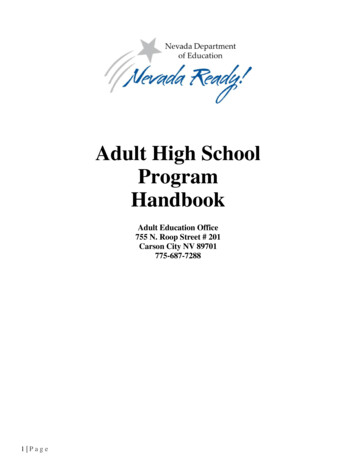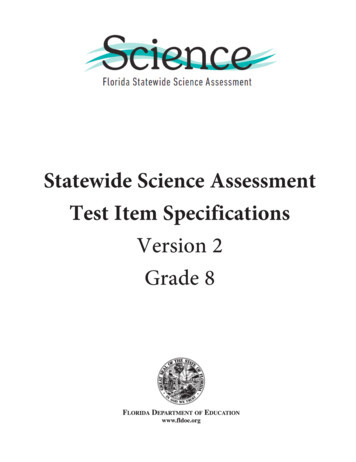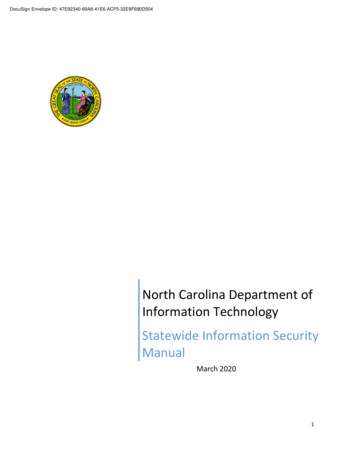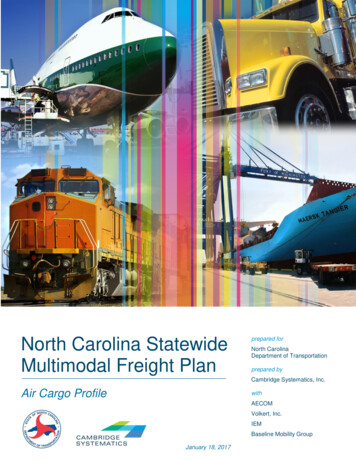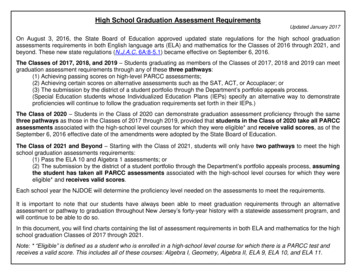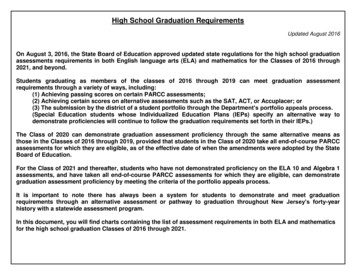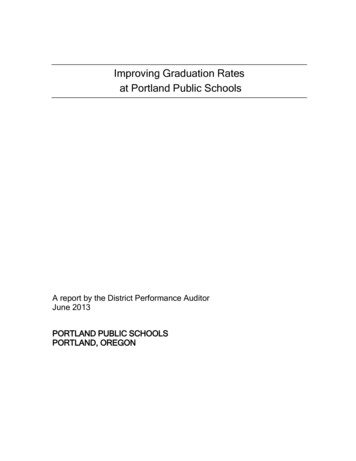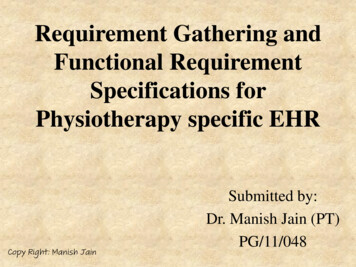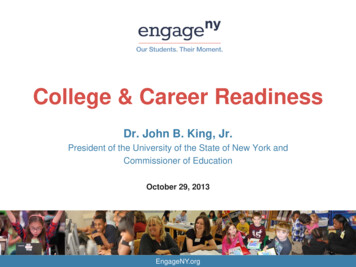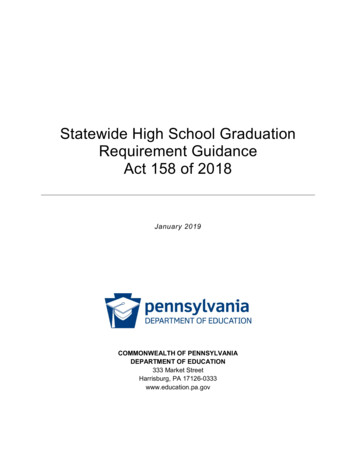
Transcription
Statewide High School GraduationRequirement GuidanceAct 158 of 2018January 2019COMMONWEALTH OF PENNSYLVANIADEPARTMENT OF EDUCATION333 Market StreetHarrisburg, PA 17126-0333www.education.pa.gov
Commonwealth of PennsylvaniaTom Wolf, GovernorDepartment of EducationPedro A. Rivera, SecretaryOffice of Elementary and Secondary EducationMatthew S. Stem, Deputy SecretaryBureau of Curriculum, Assessment, and InstructionBrian Campbell, DirectorDivision of Instructional QualityVacantThe Pennsylvania Department of Education (PDE) does not discriminate in its educational programs,activities, or employment practices, based on race, color, national origin, [sex] gender, sexual orientation,disability, age, religion, ancestry, union membership, gender identity or expression, AIDS or HIV status, orany other legally protected category. Announcement of this policy is in accordance with State Lawincluding the Pennsylvania Human Relations Act and with Federal law, including Title VI and Title VII ofthe Civil Rights Act of 1964, Title IX of the Education Amendments of 1972, Section 504 of theRehabilitation Act of 1973, the Age Discrimination in Employment Act of 1967, and the Americans withDisabilities Act of 1990.The following persons have been designated to handle inquiries regarding the Pennsylvania Departmentof Education’s nondiscrimination policies:For Inquiries Concerning Nondiscrimination in Employment:Pennsylvania Department of EducationEqual Employment Opportunity RepresentativeBureau of Human ResourcesVoice Telephone: (717) 783-5446For Inquiries Concerning Nondiscrimination in All Other Pennsylvania Department of EducationPrograms and Activities:Pennsylvania Department of EducationSchool Services Unit Director333 Market Street, 5th Floor, Harrisburg, PA 17126-0333Voice Telephone: (717) 783-3750, Fax: (717) 783-6802If you have any questions about this publication or for additional copies, contact:Pennsylvania Department of EducationBureau of Curriculum, Assessment, and Instruction/Office of Elementary and Secondary Education333 Market Street, 5th Floor, Harrisburg, PA 17126-0333Voice: (717) 787-8913, Fax: (717) 214-4389www.education.pa.govAll Media Requests/Inquiries: Contact the Office of Press & Communications at (717) 783-9802
Introduction and BackgroundAct 158 of 2018 (Act 158), which was signed into law by Governor Tom Wolf on October 24,2018, shifts Pennsylvania’s reliance on high stakes testing as a graduation requirement toprovide alternatives for high school students to demonstrate readiness for postsecondarysuccess. Formerly, Pennsylvania’s statewide graduation requirement was more restrictive,requiring most students to pass the Keystone Exams — end of course exams in Algebra I,Literature, and Biology — in order to graduate. Act 158, in conjunction with Act 6 of 2017 (Act6), expands the options for students to demonstrate postsecondary readiness through fouradditional pathways that more fully illustrate college, career, and community readiness.The statewide graduation requirement outlined in Act 6 and Act 158 takes effect for thegraduating class of 2022. While there is no statewide graduation requirement for the classes of2019, 2020, and 2021, local policies also govern graduation. Local policies are not preemptedby the current moratorium nor are they limited by the statewide requirement. School entities areencouraged to work with their solicitors to ensure that their high school graduation policiescomply with Act 6 and Act 158, which amended section 121 of the Pennsylvania Public SchoolCode, 24 P.S. § 1-121 and affected the implementation of Title 22, Chapter 4 of thePennsylvania Code.Keystone Exams will continue as the statewide assessment that Pennsylvania uses to complywith accountability requirements set forth in the federal Every Student Succeeds Act (ESSA).Although a student may not be required to achieve proficiency on the Keystone Exams in orderto graduate, students are required to take the Keystone Exams for purposes of federalaccountability. Failure to do so will affect a Local Education Agency (LEA) and school’sparticipation rate.PurposeThe purpose of these guidelines is to provide an overview of changes to the statewidegraduation requirement as a result of the enactment of Act 158. Future Department of Education(PDE) guidance will provide more detail as to the implementation of Act 158, including thecomposite Keystone score, established cut scores for alternate assessments, and guidelines todefine pathway evidence.RequirementsFor students graduating in 2022 and beyond, the following options exist to meet the statewidegraduation requirement: Keystone Proficiency Pathway: Scoring proficient or advanced on each KeystoneExam - Algebra I, Literature, and Biology.January 20191
Keystone Composite Pathway: Earning a satisfactory composite score on the AlgebraI, Literature, and Biology Keystone Exams (while achieving at least a proficient score onat least one of the three exams and no less than a basic score on the remaining two).No later than July 30, 2019, the Secretary shall recommend, and the State Board ofEducation shall approve, the satisfactory composite score. Alternate Assessment Pathway: Successful completion of locally established gradebased requirements for academic content areas associated with each Keystone Examon which the student did not achieve proficiency and one of the following:o Attainment of an established score on an approved alternate assessment (SAT,PSAT, ACT, ASVAB);o Gold Level on the ACT WorkKeys Assessment;o Attainment of an established score on an Advanced Placement Program or anInternational Baccalaureate Diploma Program exam in an academic content areaassociated with each Keystone Exam on which the student did not achieve atleast a proficient score;o Successful completion of a concurrent enrollment course in an academic contentarea associated with each Keystone Exam in which the student did not achieveat least a proficient score;o Successful completion of a pre-apprenticeship program; oro Acceptance in an accredited 4-year nonprofit institution of higher education andevidence of the ability to enroll in college-level coursework. Evidence Based Pathway: Successful completion of locally established grade-basedrequirements for academic content areas associated with each Keystone Exam on whichthe student did not achieve proficiency and demonstration of three pieces of evidenceconsistent with the student’s goals and career plans, includingo One of the following: Attainment of an established score on the ACT WorkKeys assessment, aSAT subject test, an Advanced Placement Program Exam, or anInternational Baccalaureate Diploma Program Exam; Acceptance to an accredited nonprofit institution of higher education otherthan a 4-year institution and evidence of the ability to enroll in collegelevel coursework; Attainment of an industry-recognized credential; or Successful completion of a concurrent enrollment or postsecondarycourse; ando Two additional pieces of evidence, including one or more of the options listedabove, or: satisfactory completion of a service learning project; attainment of ascore of proficient or advanced on a Keystone Exam; a letter guaranteeing fulltime employment; a certificate of successful completion of an internship orcooperative education program; or satisfactory compliance with the NCAA’s corecourses for college-bound student athletes with a minimum grade point average(GPA) of 2.0. CTE Pathway: For Career and Technical Education (CTE) Concentrators, successfulcompletion of locally established grade-based requirements for academic content areasassociated with each Keystone Exam on which the student did not achieve proficiencyand attainment of an industry-based competency certification related to the CTEConcentrator’s program of study or demonstration of a high likelihood of success on anJanuary 20192
approved industry-based competency assessment or readiness for continuedmeaningful engagement in the CTE Concentrator’s program of study.For further explanation of the CTE Pathway, please see PDE’s Act 6 guidance.A composite Keystone score will be released in August of 2019. Established cut scoresfor alternate assessments and guidelines to define pathway evidence will be released inthe 2019-20 school year.More information about the new statewide graduation requirement effective with the graduatingclass of 2022 is available on the PDE website.DefinitionsACT WorkKeys Assessment - An assessment of workplace skills administered by ACT.Advanced Placement Program (AP) - A program authorized by the college board that allows astudent to study college-level subjects while enrolled in high school and to receive advancedplacement and college credit for earning a qualified score on the course-related AdvancedPlacement exam.Approved Alternate Assessment - An SAT, PSAT, ACT or ASVAB. ACT - A standardized test for the assessment of college readiness administered byACT. Armed Services Vocational Aptitude Battery (ASVAB) - The aptitude test developedand maintained by the United States Department of Defense. SAT - A standardized test for the assessment of college readiness administered by theCollege Board.Approved Industry-Based Competency Assessment - A NOCTI exam, NIMS assessment orother industry-based competency assessment identified by the Secretary of Education. NIMS Assessment - An assessment based on the National Institute for MetalworkingSkills standards. NOCTI Exam - A National Occupational Competency Testing Institute exam.Concurrent Enrollment Course - A course in which a secondary student is enrolled and, uponsuccessful completion of which both high school and postsecondary credit are earned.Cooperative Education Program - A program of instruction whereby students alternate orcoordinate their high school studies with a job in a field related to their academic or careerobjectives.CTE Concentrator - A student who, by the end of a reporting year, will be reported assuccessfully completing at least 50 percent of the minimum technical instructional hoursrequired under 22 Pa. Code Ch. 339 (relating to vocational education).Established Score - A score recommended by the Secretary of Education and approved by theState Board of Education.GPA - Grade point average.January 20193
International Baccalaureate (IB) Diploma Program - An academically challenging two-yearprecollege diploma program comprised of three core requirements and six academic subjectareas with final examinations that prepare students 16 to 19 years of age for higher educationand life in a global society.Postsecondary Course - A course in which a secondary student is enrolled, and, uponsuccessful completion, postsecondary credit is earned.Pre-apprenticeship Program - An apprenticeship program registered with the PennsylvaniaApprenticeship and Training Council.SAT Subject Test - A standardized test for the assessment of a specific content areaadministered by the College Board.School Entity – A school district, intermediate unit, area vocational-technical school, charterschool, cyber charter school, regional charter school or multiple charter school organization.Frequently Asked Questions1. Are project-based assessments still an option to meet proficiency?No school entity may be required to offer nor, may any student be required to participatein or complete a project-based assessment in order to meet statewide graduationrequirements as provided for in 22 Pa. Code § 4.51c.School entities may choose to incorporate project-based assessments into their localgraduation requirements. To that end, project-based assessments will be made availableon the PDE Standards Aligned System website as a resource for school entities. Schooladministrators may download the projects and utilize them in the local setting, but PDEwill not manage or score the project-based assessments.For projects submitted for evaluation through March 2019 via the Project BasedAssessment website, PDE will evaluate those projects. Projects completed after March2019 are subject to evaluation at the local level.2. Do the graduation requirements apply to students who opt out of a Keystone Exam?Yes. Students who opt out of one or more Keystone Exams must still meet state andlocal graduation requirements. Students may meet the statewide graduation requirementthrough one of the multiple pathways described in the Requirements section above.Note that students opting out will affect the student participation rate related to a school’saccountability status.3. Is supplemental instruction required for those students who do not meet proficiency?A school entity may offer supplemental instruction to a student who does notdemonstrate proficiency on a Keystone Exam or on a locally validated assessment;however, no student is required to participate.When offered, supplemental instruction must:January 20194
Be consistent with the student's educational program.Assist the student to attain proficiency in the state academic standards.Ensure that students who accept the school entity's offer of supplementalinstruction are able to participate in both supplemental instruction and instructionrelated to their career, military or postsecondary education plans.When offered, supplemental instruction must not: Intrude into instructional time for career and technical education. Occur during a student's dedicated time in a career and technical educationprogram.4. May students who score proficient or advanced on a Keystone Exam retake theexam?A student who achieves a score of proficient or advanced on a Keystone Exam shallonly be permitted to retake the exam if the student or parent submits a request in writingto the school entity.5. Does a waiver option exist?A chief school administrator may grant a waiver of the requirements for demonstrationsof proficiency on the Keystone Exams or alternative graduation requirements for astudent in grade 12 or to accommodate a student who experiences extenuatingcircumstances (e.g., serious illness, death in the student’s immediate family, familyemergency, frequent school transfers, transfer from out-of-state in grade 12).Each student granted a waiver under this subsection shall complete locally established,grade-based requirements for academic content areas associated with each KeystoneExam.If the waivers granted by a chief school administrator exceed more than 5 percent ofstudents in a graduating class, PDE will conduct a review of the waivers granted by theschool entity. The school entity will be required to submit an improvement plan to PDEand will be subject to an audit conducted by PDE unless PDE determines that the 5percent threshold was exceeded because waivers were granted to students whoexperienced extenuating circumstances.6. What regulations exist for students with disabilities?A student with a disability who satisfactorily completes a special education programdeveloped by an individualized education program team under the Individuals withDisabilities Education Act and 22 Pa. Code Ch. 14 (relating to special education servicesand programs) that does not otherwise meet the requirements of this section shall begranted and issued a regular high school diploma by the student's school entity.7. Are there requirements to include Keystone Exam proficiency levels on a student’stranscript?The performance level demonstrated in each of the state academic standards, includingthe highest performance level demonstrated by a student on the associated KeystoneExam, may be included on a student’s transcript as determined by each school entity.January 20195
8. What requirements exist for student transfers from out-of-state?If a student transfers into a Pennsylvania high school from out of state, a private school,a home school environment, or from out of country, and that student’s transcript showscredit received in Algebra 1, or an equivalent course; Literature, or an equivalent course;or Biology 1, or an equivalent course, the school entity must determine whether thestudent’s performance on the coursework and assessments that are aligned with thestate academic standards assessed by each Keystone Exam satisfy the statewidegraduation requirement.9. What notifications must school entities provide to inform students, parents, andguardians of high school graduation requirements?Each school entity shall ensure students, parents and guardians are notified of theschool entity’s high school graduation requirements, including requirements establishedin law and regulations and any additional requirements established by the school entity,and shall publish its high school graduation requirements on its publicly accessiblewebsite.10. Must school entities report to the Department the number of graduates and howeach student met statewide graduation requirements?No later than December 1, 2022, and each December 1 thereafter, each school entitymust submit a report on the number of students who graduated and a summary of howproficiency was met by those students. More information will be forthcoming on themethod of reporting in future guidance.January 20196
No school entity may be required to offer nor, may any student be required to participate in or complete a project-based assessment in order to meet statewide graduation requirements as provided for in 22 Pa. Code § 4.51c. School entities may choose to incorporate project-based assessments into their local graduation requirements.
